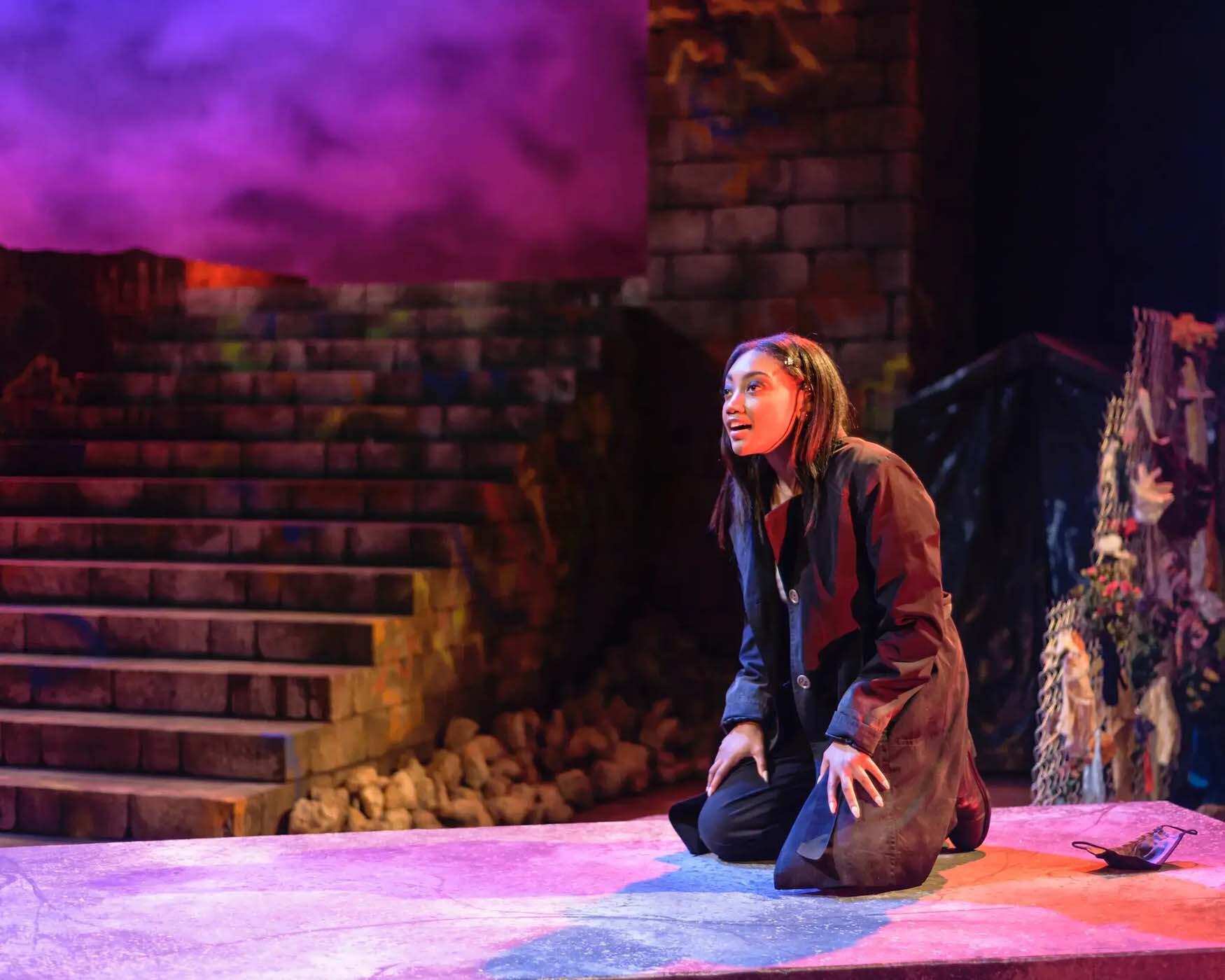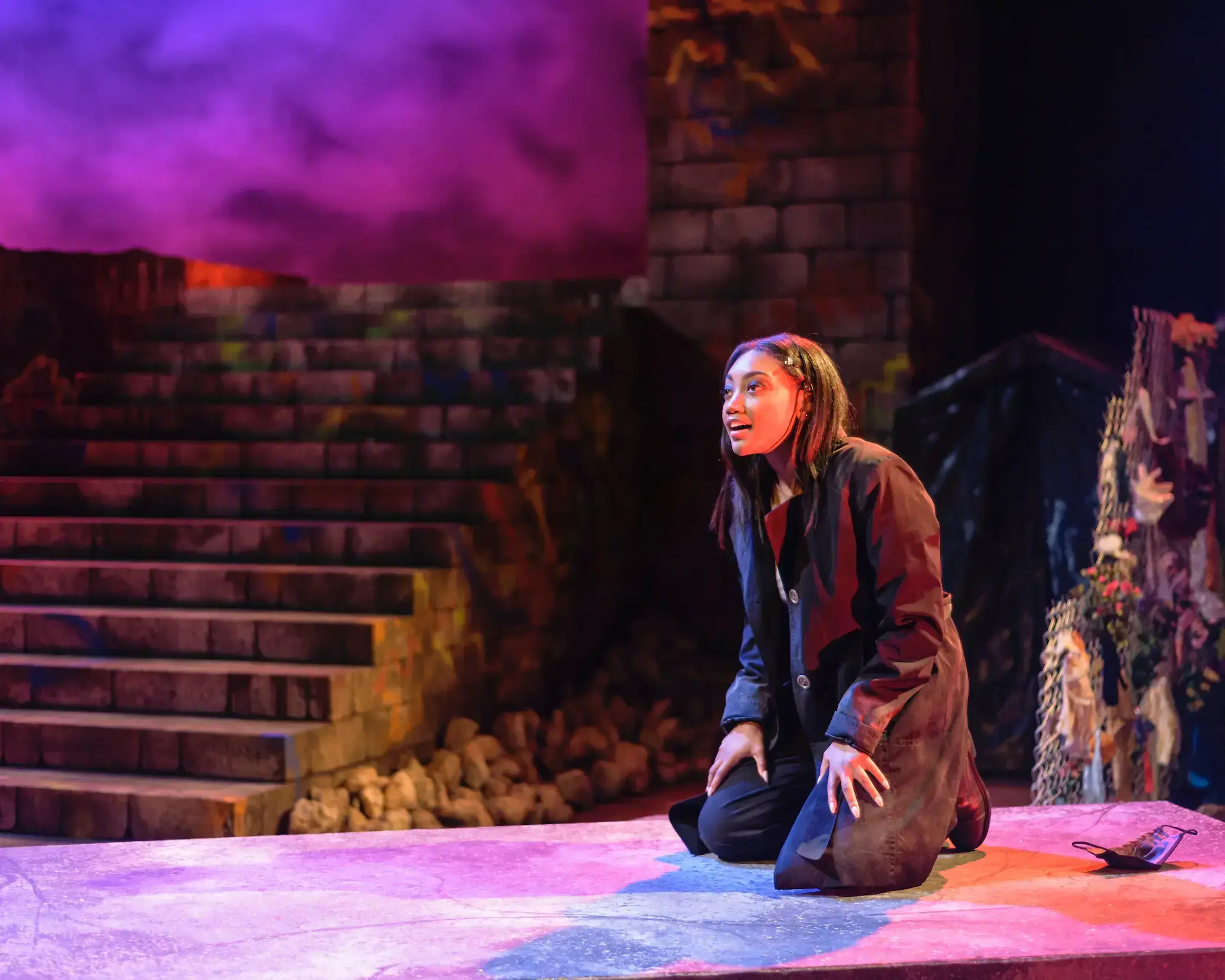

The School of Theatre's BFA in Acting is a pre-professional training program. It combines the best of conservatory/studio training with the breadth of the general education requirements that have made Oklahoma City University one of the best small universities in the U.S. There are two TRACKS that students can choose inside the BFA Acting degree: Stage and Screen Track and On-Camera Track. Both tracks share very similar classes for the first two years and then split off into specialized training tracks. See below for highlights of the two tracks and the pdf versions of both of their curriculums.
Stage & Screen Degree Requirements (PDF)
The BFA Acting degree offers two related Tracks to success: the Stage and Screen Track, and the On-Camera Track.
With the Stage and Screen Track, actors graduate with a wide tool box of skills that will allow them to pursue opportunities in contemporary theater, classical theater, musical theater, and film and television.
With the On-Camera Track, actors graduate as content creators — not just actors — ready to write, direct, act in and edit their own digital content.

While at OCU, Acting students will have several production opportunities throughout their four years.
The 21st century entertainment job market does not want one-trick ponies. We help you develop a deep and diverse tool box of skills with training that highlights:
We believe, if you can perform Shakespeare, you can do anything. With more than 200 paying Shakespeare festivals in the country, a student well-trained in classical work will always be a commodity. Our students experience a diverse body of classical work both in the classroom and on stage. By the end of your junior year, you will have performed in both a Chekhov and a Shakespeare showcase.
OCU offers two semesters of on-camera training, which is a semester more than most programs. We know the best-paying jobs in our field these days have a camera attached to it. Before graduating, our students will have learned both technical and on-screen components of the film and television industry.
Even though this is an Acting degree, there is a great focus on musical theatre skills. Students are required to take private voice with Wanda L. Bass School of Music faculty and dance classes with the Ann Lacy School of American Dance & Entertainment.
Today’s rapidly changing industry is craving artists who put their whole being on the line, turning on a dime between intimate, emotional vulnerability and bold, physical risk-taking. Theatre is becoming an athletic event, requiring artists who can fill the physically expressive demands of modern audiences and directors. We strive to unlock the boundless creativity of the next wave of performers with bold movement training that reconnects students to their primal impulses and then shapes those impulses into articulate and inspiring expressions. We believe this is best accomplished through a select combination of approaches.
“Contact improvisation is the beauty of natural movement combined with complete communication.” ~ Curt Siddall
A central element of any fine performance is an uninhibited, continuous flow of communication. In order to achieve this open exchange of communication we have to un-learn our fear. Fear of judgement. Fear of failure. Fear of conflict. A child’s natural state is to trust. She doesn’t know that the flame on the stove will hurt her until she reaches out for it and gets burned. The first time he gets his heart broken he learns not to rely on other people. Our fear response, while necessary to avoid pain in everyday life, can become a hindrance to actor training and a significant blockage of communication. Through simple weight-sharing exercises and ensemble-building techniques, Contact Improvisation teaches students to revert to their primal state of trust: trust in self and trust in others. Once this door is opened the floodgates of creativity and confidence soon follow.
“When you know what you do, you can do what you want.” ~ Moshe Feldenkrais
Moshe Feldenkrais studied the development of infantile movement in order to understand the primal urges that drive us to move and organize ourselves so we can function. He realized that by returning to those fundamental organizing patterns he would connect his students to the essential elements of movement and thereby eliminate their reliance on the unnecessary stresses that people acquire throughout life. This return to our primitive essence brings them out of the shadows of mindless habit and ushers them toward a life that is lived with intention and purpose. Through the use of Feldenkrais’ Awareness Through Movement® and Functional Integration® lessons students gain a deep personal understanding of their bodies which may have been on auto-pilot for over a decade. Once they are equipped with a more conscious awareness of themselves they have the ability to turn habits into choices.
“Artists and scientists are activists. They look at the world as changeable and they look upon themselves as instruments for change. They understand that the slice of world they occupy is only a fragment but that the fragment is intrinsically connected to the whole. They know that action matters.” ~ Anne Bogart
These two methods of actor training are fast becoming some of the most widely practiced in the industry. The combination of improvisation, discipline, and precise storytelling create an immediately accessible vocabulary for artists in any part of the work and any part of the world. While Tadashi Suzuki’s exercises require an unprecedented level of physical control and imaginative investment, Anne Bogart’s Viewpoints & Composition training gives students a logical framework on which to hang the chaos of human experience.
“The successful warrior is the average man with laser-focus.” ~ Bruce Lee
Every BFA Acting student at OCU is trained in basic unarmed and single sword technique in keeping with the standards set forth by the Society of American Fight Directors. In addition to the in-class training there are also a multitude of regional SAFD weekend workshops that immerse students in a wide variety of weapons and physical disciplines, as well as provide a critical networking opportunity with some of the top working professionals in the country. Some of the weapons that have been covered in class are unarmed, single sword, rapier & dagger, quarterstaff, kali sticks, and poi spinning.
Voicework is essential for performers. We explore the voice-body connection through the lens of voice, and breathwork. Developing coordinated vocal and physical habits will allow you to present a more authentic performance. Authenticity comes from your ability to connect with text and bring it to life.
Our voice curriculum draws from a wide combination of pedagogical influences including but not limited to: Patsy Rodenburg, Linklater Voicework, Lessac Voicework, Emotional Effector Patterns, and Knight-Thompson Speechwork. Our classes help develop a creative habit that not only caters to the artist's performance skills, but serves the artist outside of the rehearsal hall. The work reinforces resilience, sustainable practices, connection, flexibility, stamina, variety, and vocal health required to sustain a career in the arts.
Actor's Instrument: A first-year introduction to the voice and the body for the actor, rooted in developing body awareness, breath awareness and cultivating presence. Students will explore personal awareness of habits and blocks that limit vocal nuance and physical ease in performance. They will gain a beginning understanding of basic vocal anatomy, how the voice works and why it may not. Students will connect vocal production to text through imagistic poetry, storytelling, creating a concrete warm up, and exploring vocal variety.
Vocal Production 1: An introductory professional voice course designed to expand body-breath awareness, and the ability to identify and release tension in the body that obstructs the natural expression of the self. Students work to condition vocal stamina sufficient for handling heightened text, supporting physically active and demanding texts, and sustaining long thoughts. The student will gain the ability to adjust their personal style to accommodate and express a wide variety of dramatic and non-dramatic texts from a range of periods and styles through use of body and voice.
Vocal Production 2: A continuation of the advanced professional-training voice course designed to build on the practice of Voice 1. The course challenges the student to transcend the work of Voice 1 to develop a deeper understanding of body and breath.
Voice Training & Dialects: This course in dialects is intended to develop the foundation of clear and authentic dialects for performance through a process that is descriptive not prescriptive. Students will learn the International Phonetic Alphabet. They will develop a familiarity with the musculature and structure of the oral cavity and how this can be manipulated to produce authentic sound. They will develop the ability to breakdown and learn different accents that will serve their individual identities.
"This class has made me a MUCH bolder actor. Before, I was very hesitant to do something out of the ordinary with my work, but now I’ve realized that the extraordinary work is the work that matters most."
-Joseph Derby, BFA Acting Class of 2022
"Vocal Prod challenged and inspired me in ways I wasn't expecting. The entire curriculum is truly based on discovery instead of 'getting it right,' which is something I think more people need in their lives and education."
-Olivia Story, BFA Acting Class of 2022
Students will learn what adjustments actors need to make in order to perform in front of a camera. Scenes will be presented and reshot for analysis. Exercises will be performed to help actors get used to the technical differences of acting for the camera. Actors will learn what life on a set is truly like. Everything from reading a call sheet, hitting a mark, and the intense preparation needed to work in film and television will be discussed.
On-Camera Acting is meant to give students a wide range of tools, so they can confidently walk onto a set and be ready to perform with the same comfort level as they walk onto a stage.
On-Camera Acting I: An introduction to the basic principles of professional on-camera acting for film and television. Students will get a chance to work on monologues and reaction scenes, while also learning about the technical basics of working on a film or television set.
Advanced On-Camera Acting: A continuation of On-Camera I, Advanced On-Camera Acting will give the students a chance to explore scene work, cold readings, and technical exercises to heighten their awareness and hone their skills in front of a camera.
